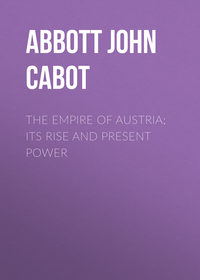Kitabı oku: «The Empire of Austria; Its Rise and Present Power», sayfa 27
Bir şeyler ters gitti, lütfen daha sonra tekrar deneyin
Türler ve etiketler
Yaş sınırı:
0+Litres'teki yayın tarihi:
30 kasım 2018Hacim:
601 s. 2 illüstrasyonTelif hakkı:
Public Domain